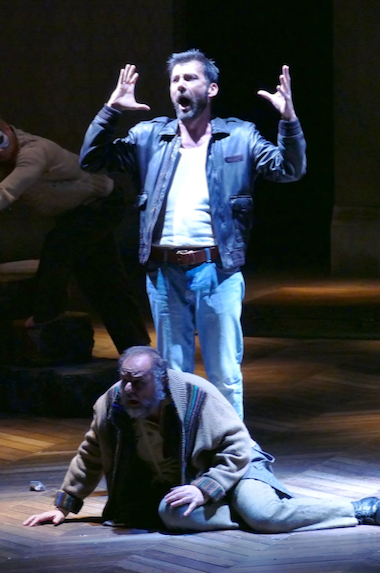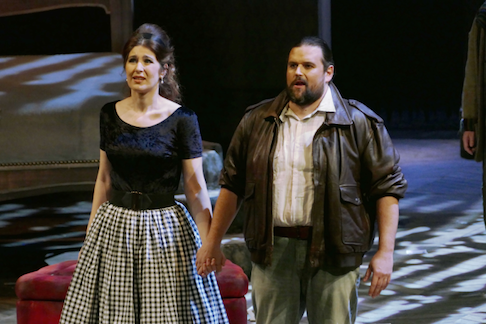Recently in Reviews
English Touring Opera are delighted to announce a season of lyric monodramas to tour nationally from October to December. The season features music for solo singer and piano by Argento, Britten, Tippett and Shostakovich with a bold and inventive approach to making opera during social distancing.
This tenth of ten Live from London concerts was in fact a recorded live performance from California. It was no less enjoyable for that, and it was also uplifting to learn that this wasn’t in fact the ‘last’ LfL event that we will be able to enjoy, courtesy of VOCES8 and their fellow vocal ensembles (more below …).
Ever since Wigmore Hall announced their superb series of autumn concerts, all streamed live and available free of charge, I’d been looking forward to this song recital by Ian Bostridge and Imogen Cooper.
The Sixteen continues its exploration of Henry Purcell’s Welcome Songs for Charles II. As with Robert King’s pioneering Purcell series begun over thirty years ago for Hyperion, Harry Christophers is recording two Welcome Songs per disc.
Although Stile Antico’s programme article for their Live from London recital introduced their selection from the many treasures of the English Renaissance in the context of the theological debates and upheavals of the Tudor and Elizabethan years, their performance was more evocative of private chamber music than of public liturgy.
In February this year, Albanian soprano Ermonela Jaho made a highly lauded debut recital at Wigmore Hall - a concert which both celebrated Opera Rara’s 50th anniversary and honoured the career of the Italian soprano Rosina Storchio (1872-1945), the star of verismo who created the title roles in Leoncavallo’s La bohème and Zazà, Mascagni’s Lodoletta and Puccini’s Madama Butterfly.
Evidently, face masks don’t stifle appreciative “Bravo!”s. And, reducing audience numbers doesn’t lower the volume of such acclamations. For, the audience at Wigmore Hall gave soprano Elizabeth Llewellyn and pianist Simon Lepper a greatly deserved warm reception and hearty response following this lunchtime recital of late-Romantic song.
Collapsology. Or, perhaps we should use the French word ‘Collapsologie’ because this is a transdisciplinary idea pretty much advocated by a series of French theorists - and apparently, mostly French theorists. It in essence focuses on the imminent collapse of modern society and all its layers - a series of escalating crises on a global scale: environmental, economic, geopolitical, governmental; the list is extensive.
For this week’s Live from London vocal recital we moved from the home of VOCES8, St Anne and St Agnes in the City of London, to Kings Place, where The Sixteen - who have been associate artists at the venue for some time - presented a programme of music and words bound together by the theme of ‘reflection’.
'Such is your divine Disposation that both you excellently understand, and royally entertaine the Exercise of Musicke.’
Amongst an avalanche of new Mahler recordings appearing at the moment (Das Lied von der Erde seems to be the most favoured, with three) this 1991 Mahler Second from the 2nd Kassel MahlerFest is one of the more interesting releases.
‘And there was war in heaven: Michael and his angels fought against the dragon; and the dragon fought and his angels, And prevailed not; neither was their place found any more in heaven … that old serpent … Satan, which deceiveth the whole world: he was cast out into the earth, and his angels were cast out with him.’
If there is one myth, it seems believed by some people today, that probably needs shattering it is that post-war recordings or performances of Wagner operas were always of exceptional quality. This 1949 Hamburg Tristan und Isolde is one of those recordings - though quite who is to blame for its many problems takes quite some unearthing.
There was never any doubt that the fifth of the twelve Met Stars Live in Concert broadcasts was going to be a palpably intense and vivid event, as well as a musically stunning and theatrically enervating experience.
‘Love’ was the theme for this Live from London performance by Apollo5. Given the complexity and diversity of that human emotion, and Apollo5’s reputation for versatility and diverse repertoire, ranging from Renaissance choral music to jazz, from contemporary classical works to popular song, it was no surprise that their programme spanned 500 years and several musical styles.
The Academy of St Martin in the Fields have titled their autumn series of eight concerts - which are taking place at 5pm and 7.30pm on two Saturdays each month at their home venue in Trafalgar Square, and being filmed for streaming the following Thursday - ‘re:connect’.
The London Symphony Orchestra opened their Autumn 2020 season with a homage to Oliver Knussen, who died at the age of 66 in July 2018. The programme traced a national musical lineage through the twentieth century, from Britten to Knussen, on to Mark-Anthony Turnage, and entwining the LSO and Rattle too.
With the Live from London digital vocal festival entering the second half of the series, the festival’s host, VOCES8, returned to their home at St Annes and St Agnes in the City of London to present a sequence of ‘Choral Dances’ - vocal music inspired by dance, embracing diverse genres from the Renaissance madrigal to swing jazz.
Just a few unison string wriggles from the opening of Mozart’s overture to Le nozze di Figaro are enough to make any opera-lover perch on the edge of their seat, in excited anticipation of the drama in music to come, so there could be no other curtain-raiser for this Gala Concert at the Royal Opera House, the latest instalment from ‘their House’ to ‘our houses’.
"Before the ending of the day, creator of all things, we pray that, with your accustomed mercy, you may watch over us."
Reviews

19 Feb 2019
Faust in Marseille
We sat, bewildered, all of us, watching (enduring) Gounod’s sweet little tear jerker as a nasty drug trip. Except for the Australian Marguerite it was an all French cast and they all gamely played along, the sophisticated verse of Offenbach’s librettists Jules Barbier and Michel Carré clearly sailing out over an abrasive pit.
It was a difficult evening at the Opéra de Marseille, a fine cast in service of a production from the Opéra Grand Avignon where stage director Nadine Duffaut has staged 14 productions over the years for her husband Raymond Duffaut, Avignon Opera’s guiding light since 1977 when he was appointed general director by his father, the then mayor of Avignon.
Opera in the south of France traditionally has been mired in politics, the complexities of which extend to the complicities of the Provençal opera houses. This 2017 Avignon Faust soon travels from Marseille to Nice for performances in May.
Mme. Duffaut is in fact an able metteur en scène. Her 2016 Opéra Grand Avignon production of Katja Kabanova which I saw at the Opéra de Toulon (45 miles from Avignon) proved her to be a meticulous storyteller, Janacek’s turgid tale of the intricacies of family and business coinciding with Mme. Duffaut’s obsession with detail. The Katja Kabanova unfolded in nothing more than a white box, Janacek’s motivic complexities directly objectified by Mme. Duffaut’s actors.
Such was not the case in this much reviled production as seen just now in Marseille. The simple bel canto like dramatic structure of Gounod’s naive story was amplified into a complex, bizarre nightmare that can only be deciphered by Mme. Duffaut. There were actually two Fausts, the old one and the young one. Siebel was not Gounod’s trouser role, instead he was sung by a crippled tenor. There was historical black and white film footage of Valentin’s war that was most likely the Franco-Algerian war. All this to make Gounod’s Faust real.
 Nicole Car as Marguerite, Jean-Françoise Borras as the young Faust
Nicole Car as Marguerite, Jean-Françoise Borras as the young Faust
The chorus however was an abstract mass of masked black and white movement, the Kermesse enlivened by three contortionist acrobats. Marguerite was at first a huge image projected on a full stage scrim, who later became real in a costume that shouted early 1960’s only to become a huge doll (20 feet or so), then to give birth realistically a vista, and finally to become a shaft of light for her salvation.
Mme. Duffaut’s long time collaborator, set designer Emmanuelle Favre provided a huge, architecturally detailed box, with a shadow box within the back wall covered by a painting of Jesus wearing a crown of abundant thorns (Bosch?) behind which the old Faust appeared from time to time (when he wasn’t writhing on the stage floor). There were occasional projections of leaves, branches and flowers. All in all it was not a pretty sight — what you could see of it through the bizarre lighting effected by Philippe Grosperrin.
77 year-old American conductor Lawrence Foster therefore took the opportunity to forgo exploiting the sweetness of Gounod’s trivial sentimentality in search of a deeper, desperate musical response to the nightmare Mme. Duffaut had erected on the stage. What resulted was a strident deconstruction of French Romanticism, revealing an emotionless musical skeleton. If nothing else this approach revealed the Gounod score to be technically daunting, engendering new respect for the often discounted genius of this composer.
Red shoed Nicolas Courjal was the Méphistophélès. This splendid bass reveled in the lighter banter of Gounod’s score, his words tumbling out into the house providing some moments of true delight in this otherwise lugubrious evening. As did vocal meanderings of the beautifully voiced and extremely well sung Faust of tenor Jean-François Borras, far more at home in French than in Italian as Boito’s Faust (Mefistofele) last summer in Orange. Nicole Car’s Marguerite was a vocal extravaganza indeed, but unlike Faust and the devil she did not find character. Étienne Dupuis as well did not find character in his beautifully sung Valentin, though in his case he was musically trounced by the conducting.
Tenor Kévin Amiel was the frustrating Siebel, frustrating because I really needed the mezzo vocal color. The old Faust, Jean-Pierre Furlan gave Faust’s "Rien! En vain j'interroge" in vocal shreds. Marthe, sung by Jeanne-Marie Lévy, sounded mature indeed. Strangely the student Wagner, played by Philippe Ermelier was about 50 years-old.
Bass Nicolas Courjal travels with the production to Nice. Marguerite there will be sung by Nathalie Manfrino of the original Avignon cast. Stefano Secco will be an Italianate Faust. Italian conductor Giuliano Carella (Toulon Opera’s music director) hopefully may provide a starkly different musical atmosphere though the production will remain hopeless.
Nice be warned.
Michael Milenski
Cast and production information:
Marguerite: Nicole Car; Marthe: Jeanne-Marie Levy; Faust: Jean-François Borras: Vieux Faust: Jean-Pierre Furlan; Méphistophélès: Nicolas Courjal; Valentin: Étienne Dupuis; Wagner: Philippe Ermelier; Siebel: Kévin Amiel. Orchestre et Chœur de l’Opéra de Marseille. Conductor: Lawrence Foster; Mise en scène: Nadine Duffaut; Décors: Emmanuelle Favre; Costumes: Gérard Audier; Lumières: Philippe Grosperrin. Opera de Marseille, Marseille, France, February 16, 2019.

